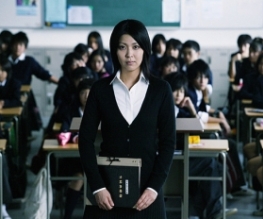Confessions

Japanese schoolchildren are – stereotypically – as cute and identikit as Tamagotchis. They’re so innocent they won’t even mind if you buy their used knickers from vending machines in the city. Their little foreheads would never display anything as charmless as a frown. Lauded Japanese director Tetsuya Nakashima posits a starkly different view of schoolchildren in Confessions.
The classroom has gone wild. Wan teacher Yuko Moriguchi (Takako Matsu) drifts gently through the chaos, ignored as she recounts her tragic life while stepping up and down the aisles. Finally, in softly formal tones, Yuko expresses her conviction that two of the children in that classroom have intentionally killed her little girl…
Talk of murder finally quietens the class. And when Yuki reveals the names of the two little murderers, protected from the justice system by means of their age, a campaign of psychological warfare is set in place with potentially cataclysmic consequences for all.
Nakashima begs us to consider the possibility that – whether it be through the machinations of the evil media, or through hormones, or just through human fallacy – Japanese schoolchildren are unremittingly evil little beasts who have no respect for authority, no respect for the sanctity of life and little respect for themselves. And then they grow up to be equally vile adults. If your tastes run to a drama more bone-chilling than most Japanese horrors (which usually amount to suspenseful ghost stories), read on.
Nakashima is considered a cinematic genius in Japan. Kamikaze Girls, a riot of colour and culture clashes, was a critical and commercial success. Several others have followed since then, each one an international talking-point. Though he has his favoured themes, Nakashima prefers not to be penned in as a director – he might be best compared to Darren Aronofsky, or indeed Gus Van Sant – ‘genre-busting auteur’ is a label that’s being thrown around, and Japan trusted Nakashima enough that Confessions was put forward for ‘best foreign language film’ at the Oscars.
Like Kamikaze Girls, Confessions is based on a novel. But Confessions replaces the zany heart and colour of Kamikaze Girls with neutral tones and a grainy Radiohead soundtrack to create a film as dissociated as Elephant and as dark as Requiem for a Dream.
Tetsuo Nakashima’s Confessions is not without its message, shooting poisoned darts at every social malady from school bullying to AIDS victimisation to the ill-used power of the media. Essentially, though, Confessions is a revenge drama. As the bonds between the victims and perpetrators tighten, the plot escalates to a superbly chilling finale (‘just kidding’? What an abyss lies behind those words). No-one is clean. Humans are rotten fruit. A cheery message. It’s enough to make you put on the Marigolds and spend the rest of your life in a state of extreme OCD in order to avoid touching (nasty, they’re all nasty) people ever again. A nasty film, yes. But that is its delight.
Confessions (15) is released on two-disc DVD (£14.99) and single-disc Blu-ray (£19.99) by Third Window Films on 25th April 2011.








Recent Comments